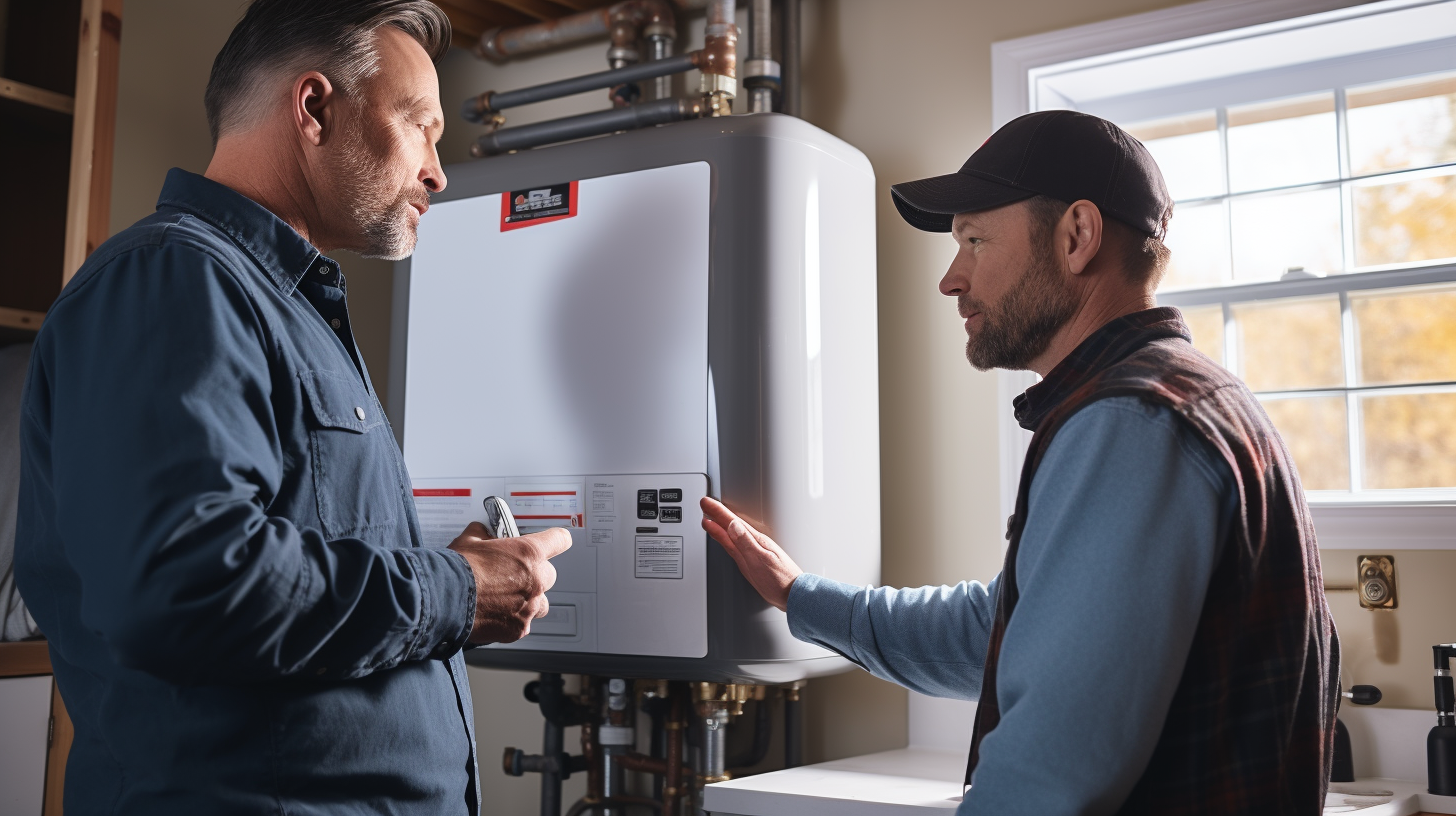We've gathered the best methods for tankless water heater repair in one place. If you're tired of dealing with common issues or looking to troubleshoot your heater, you're in the right spot.
Our step-by-step guide, along with professional tips, will help you keep your tankless water heater running smoothly. With the right tools and some maintenance, you can save money and avoid headaches.
So, let's get started on fixing your tankless water heater!
Common Issues With Tankless Water Heaters
Common issues with tankless water heaters include:
- Temperature fluctuations: This occurs when the water heater fails to maintain a consistent temperature, resulting in hot and cold bursts of water.
- Inadequate hot water supply: Another common issue is when the heater cannot provide enough hot water for multiple showers or appliances simultaneously.
- Ignition failures: This happens when the heater fails to ignite, leaving homeowners without hot water.
Understanding these common issues is crucial for homeowners to be able to identify and address them promptly. By knowing what to look out for, homeowners can take the necessary steps to resolve these problems and ensure their tankless water heaters are functioning optimally.
Troubleshooting Techniques for Tankless Water Heaters
To troubleshoot tankless water heaters effectively, we need to identify the underlying causes of the common issues discussed earlier.
One of the most common problems with tankless water heaters is a lack of hot water. If you're experiencing this issue, it could be due to a clogged or faulty heat exchanger. To fix this, you can try flushing the system with vinegar to remove any mineral deposits that may be obstructing the flow of water.
Another common issue is fluctuating water temperatures. This could be caused by a malfunctioning temperature sensor or a problem with the water flow rate. Checking and cleaning these components can help resolve the problem.
Additionally, if you're experiencing error codes on your tankless water heater, referring to the manufacturer's manual or contacting a professional plumber can help you troubleshoot and fix the issue.
Tools Needed for Tankless Water Heater Repair
For tankless water heater repair, we'll need specific tools to effectively troubleshoot and fix common issues. Having the right tools can make the repair process much easier and more efficient.
One essential tool is a multimeter, which is used to measure voltage, resistance, and continuity. This tool helps us identify electrical problems and determine if components are functioning properly.
Another important tool is a pipe wrench, which is used to loosen or tighten pipe connections. It's crucial for disconnecting and reconnecting water and gas lines during the repair process.
Additionally, a descaling kit is necessary for descaling the heat exchanger and removing mineral build-up. This kit usually includes a descaling solution and a pump to flush out the system.
With these tools, we can confidently tackle tankless water heater repairs and ensure optimal performance.
Step-By-Step Guide for Tankless Water Heater Maintenance
To properly maintain a tankless water heater, we follow a step-by-step guide.
Firstly, we recommend checking the manufacturer's guidelines for specific maintenance instructions.
Next, turn off the power supply to the heater and shut off the water supply.
Use a descaling solution to remove any mineral deposits that may have accumulated inside the unit.
Rinse thoroughly with clean water and ensure proper drainage.
Inspect the vents and exhaust pipes for any blockages or debris and remove them if necessary.
Check the pressure relief valve for leaks and make sure it's functioning properly.
Finally, turn on the water and power supply, and monitor the unit for any signs of leakage or malfunction.
Regular maintenance will help prolong the lifespan of your tankless water heater and ensure optimal performance.
Professional Tips for Repairing Tankless Water Heaters
We rely on professional expertise to provide us with the top methods for repairing tankless water heaters.
When it comes to repairing tankless water heaters, there are a few professional tips that can help ensure a successful repair.
Firstly, it's important to troubleshoot the issue by checking the power supply, gas supply, and water flow. This can help identify the root cause of the problem and guide the repair process.
Additionally, it's crucial to follow the manufacturer's instructions and guidelines for repairing the specific model of tankless water heater. This will ensure that the repair is done correctly and safely.
Lastly, it's recommended to seek professional help if the repair seems complex or if you're unsure about the process. Professional technicians have the experience and knowledge to handle tankless water heater repairs effectively.
Frequently Asked Questions
What Are the Common Signs of a Malfunctioning Tankless Water Heater?
When it comes to tankless water heaters, it's important to be aware of common signs of malfunction. These indicators can help us identify potential issues early on.
Signs of a malfunctioning tankless water heater may include:
- Inconsistent water temperature
- Inadequate hot water supply
- Strange noises coming from the unit
- Error codes displayed on the control panel
Being vigilant and recognizing these signs allows us to take appropriate action and seek the necessary repairs.
How Often Should I Perform Maintenance on My Tankless Water Heater?
We should perform maintenance on our tankless water heater regularly to ensure its optimal performance. It's recommended to have professional maintenance done at least once a year.
Regular maintenance helps to prevent any potential issues and extends the lifespan of the heater. Additionally, performing routine maintenance allows us to identify and address any minor problems before they escalate into major repairs.
Can I Repair a Tankless Water Heater on My Own, or Should I Hire a Professional?
We can repair a tankless water heater on our own, but sometimes it's best to hire a professional. Depending on the issue, DIY repairs can be cost-effective and relatively simple. However, complex problems or lack of experience may lead to more damage.
Professional technicians have the expertise and tools to diagnose and fix the problem efficiently. It's essential to weigh the pros and cons before deciding whether to tackle the repair ourselves or seek professional help.
Are There Any Safety Precautions I Should Take When Repairing a Tankless Water Heater?
When repairing a tankless water heater, it's important to consider safety precautions. We should always turn off the power supply and shut off the gas before attempting any repairs.
Additionally, wearing protective gloves and goggles is recommended to prevent injuries. It's also crucial to follow the manufacturer's instructions and guidelines for the specific model.
If you're unsure or uncomfortable with DIY repairs, it's best to hire a professional to ensure the job is done safely and correctly.
Is It Possible to Convert a Traditional Water Heater to a Tankless System?
It is possible to convert a traditional water heater to a tankless system. This conversion involves removing the storage tank and installing a tankless unit in its place.
However, it's important to note that this process can be complex and may require professional assistance.
Additionally, you should consider factors such as the size of your home and the demand for hot water before making the switch.
Consulting with a qualified plumber is recommended to ensure a successful conversion.
Conclusion
In conclusion, these top methods for tankless water heater repair are essential for troubleshooting common issues and maintaining the functionality of your unit.
By following the step-by-step guide and utilizing the necessary tools, you can effectively address any problems that may arise.
It's also advisable to seek professional advice when needed to ensure the best results.
With these techniques, you can keep your tankless water heater running smoothly and enjoy a continuous supply of hot water.



